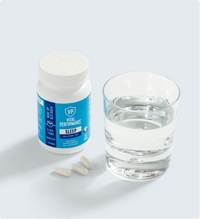Psychodermatology is a relatively new area of study which takes a look at the interaction between the mind and skin. And with it can come changes to your wellbeing. To explore this further, we synced up with experts in the field to learn more about the latest practice. So if you're ready to get the insight on what it is and how it can impact you, keep scrolling.
Can mental health affect your skin?
As a dermatologist, Alia Ahmed, BSc, MRCP, Consultant Dermatologist at Eudel knows her patients with skin issues are at higher risk of developing poor psychological health, meaning they’re more likely to feel “embarrassed, low, anxious, have body image issues and feel socially isolated." In turn, these feelings can then impact their skin and it can turn into a vicious cycle.
This is where psychodermatology comes in. It takes a look at not only the underlying skin condition, but the psychological impact it can have on the candidate.
Related Articles
What exactly is psychodermatology?
Matthew Traube, MFT, explains that psychodermatology is essentiallythe interface between the mind and skin. The crux of psychodermatology involves the relationship between skin conditions and mental health, so treatment goes beyond solely curing what might be happening on the surface.
“For example, someone with acne may be feeling anxious about being in a social environment because of their skin, so in addition to treating their acne, I will discuss techniques they can use to overcome these feelings and empower them to do the things they want,” Ahmed explains.

How does treatment work?
How does treatment work?
She’ll also assess the person as a whole, talk at length about their lifestyle,skincare regimes, work/study environment and relationships. “Lifestyle choices can impact skin health, so it is important to consider the amount of sleep people are getting, their daily fluid intake, food choices and amount of time spent exercising,” she adds. “Most people do not realize the impact of psychological health on skin and psychodermatology empowers patients to recognize and manage psychosocial factors at the same time as treating their skin condition.” In some cases, where psychological distress is severe, she’ll treat this with mood or anxiety-managing medications.
Traube points out that it’s not uncommon for people to tell him that their skin condition either starts at a particularly stressful time or get worse when their stress level change. “Understanding the underlying psychological components of the skin condition is helpful — if someone has a flare-up related to a certain event, understanding why certain experiences trigger the flare-up can help reduce them,” he says.
One other factor pertaining to treatment is that certain patients might benefit from a multi-specialty approach. “Some dermatologists don’t feel comfortable addressing any primary psychiatric disorders due to the need to treat with psych meds rather than dermatology medications,” saysGina Caputo, DO, FAAD, FAOCD, Board-Certified Dermatologist. “My goal with primary psychiatric disorders is to establish trust and hope to get some clarity on their part with the use medications, so I can convince them to get the help they need with a psychiatrist.”

Who benefits from psychodermatology?
In terms of who benefits from psychodermatological treatment, Traube notes that people who experience stress or shame or hopelessness due to a skin issue would be good candidates. “This might manifest as avoidant behavior such as not participating in social events and limiting dating because of issues related to the skin—people can also become avoidant at work or school,” he adds.
Caputo also remarks that essentially anyone can benefit from an “empathetic and caring doctor who recognizes the role of disease in the emotional state.”
"Early identification of a person with depression suffering from psoriasis or acne can open the door for that patient to take action and find freedom from that burden, and as physicians, we can work to destigmatize mental disease, especially depression and hopefully prevent suicide,” she says.
The longterm impact of psychodermatology
One last important thing to reiterate is that psychodermatology not only helps treat a skin condition but helps patients get into a better state of mind. Traube tells Lively that by increasing our awareness around negative thinking related to the skin occurs, we give ourselves the opportunity to change our patterns.
“Let’s say you often feel insecure about going on a date because you have acne and your mind is telling you that there is no way the person will like you while you have acne on your face,” he says. “First, we want to identify that negative thinking is occurring — if we do not label it, then how can we address it? Second, we want to question our thinking.” So, instead of your mind automatically going to a place of, “No one will like me when I have acne,” you’ll be able to question these thoughts and overtime create a mindset that is healthier and recognize that of course, this isn’t the case.
Vital Note: This article has been made available for informational and educational purposes only. It is not intended to be a substitute for professional medical advice, diagnosis, or treatment. Always seek the advice of your physician or another qualified health provider with any questions you may have regarding a medical condition. Your licensed healthcare professional can best provide you with the diagnosis and treatment of any medical condition and assist you as well in deciding whether a dietary supplement will be a helpful addition to your regimen.













